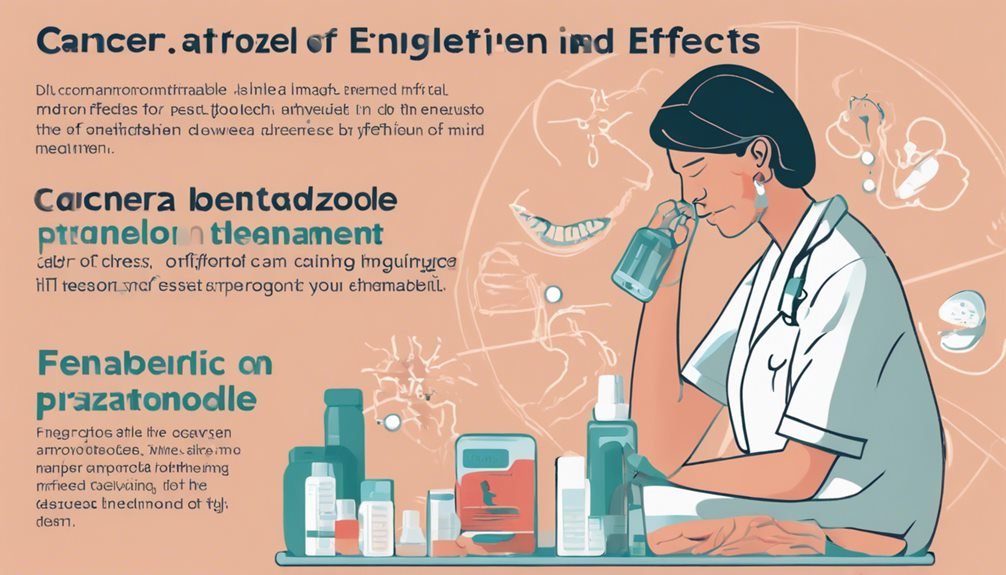Picture this: a humble dewormer designed for animals, now sparking conversations in the realm of cancer treatment. The intriguing potential of fenbendazole in combating cancer has raised eyebrows and fueled curiosity among researchers and patients alike. How does a compound meant to rid animals of parasites hold promise in the fight against cancer? The unexpected journey of fenbendazole in cancer therapy invites a closer look at its mechanisms and implications.
Key Takeaways
- Fenbendazole shows promise in cancer treatment beyond its original veterinary use.
- Studies reveal fenbendazole's ability to inhibit cancer cell growth and induce apoptosis.
- Combination therapy with traditional cancer treatments can enhance efficacy.
- Ongoing research focuses on safety, dosage optimization, and innovative delivery methods.
- Patients should consult healthcare providers for guidance on fenbendazole use in cancer treatment.
History of Fenbendazole
Fenbendazole, originally developed as a veterinary dewormer, has a rich history that dates back several decades. With its veterinary origins, this medication was primarily used to combat parasitic infections in animals. Its anti-parasitic properties made it a valuable tool in veterinary medicine for treating a variety of internal parasites.
Over time, researchers began to explore the potential benefits of fenbendazole beyond its initial use. Studies emerged indicating that this compound might have effects beyond just deworming. This led to investigations into its potential applications in human health, including the surprising discovery of its possible role in cancer treatment.
The journey of fenbendazole from a humble veterinary dewormer to a potential cancer treatment showcases the importance of exploring existing medications for new purposes. This history highlights the significance of continuous research and innovation in the medical field, demonstrating how a drug designed for one specific use can hold unexpected promise in serving others in different ways.
Mechanism of Action
Understanding the mechanism of action of fenbendazole is crucial for comprehending its potential effects as a cancer treatment option. Fenbendazole functions by disrupting microtubule formation in cells, affecting the cell cycle and leading to apoptosis. In cancer cells, this disruption can inhibit their ability to divide and grow uncontrollably, ultimately inducing cell death through apoptosis mechanisms.
Fenbendazole's interference with microtubule assembly impacts the cell cycle by arresting cells in the G2/M phase, preventing further division. This disruption can trigger programmed cell death, known as apoptosis, which is a vital process in eliminating damaged or abnormal cells.
By promoting apoptosis in cancer cells, fenbendazole may help to limit tumor growth and progression.
Understanding how fenbendazole influences the cell cycle and induces apoptosis mechanisms provides insight into its potential as a cancer treatment. By targeting key processes in cancer cell survival and proliferation, fenbendazole offers a unique approach that warrants further investigation in the realm of cancer therapy.
Preclinical Studies

In preclinical studies, researchers have investigated the efficacy of fenbendazole as a potential cancer treatment through rigorous experimentation and analysis. Efficacy evaluation in these studies has shown promising results, with fenbendazole demonstrating inhibitory effects on cancer cell growth and proliferation. Furthermore, toxicity assessment has revealed that fenbendazole exhibits a favorable safety profile, making it a potentially viable option for cancer treatment.
Through meticulous examination, researchers have observed that fenbendazole disrupts microtubule formation in cancer cells, leading to cell cycle arrest and ultimately inducing apoptosis. These findings suggest that fenbendazole may hold significant potential in combating various types of cancer.
Moreover, toxicity studies have indicated that fenbendazole is well-tolerated at doses effective against cancer cells, with minimal adverse effects reported. This is encouraging news for patients and healthcare providers seeking alternative and compassionate cancer treatment options.
Clinical Trials Overview
Exploring the realm of clinical trials provides a crucial step in determining the real-world effectiveness of fenbendazole as a potential cancer treatment. Efficacy results from these trials offer valuable insights into the drug's impact on various types of cancer. Participant demographics play a significant role in understanding how fenbendazole may benefit different groups of individuals.
In recent clinical trials, researchers have observed promising efficacy results when fenbendazole is used as part of cancer treatment protocols. These results suggest that fenbendazole may have the potential to enhance the effectiveness of conventional cancer therapies or even act as a standalone treatment in certain cases.
Understanding participant demographics in these trials is essential for tailoring treatment approaches. By analyzing factors such as age, gender, cancer type, and previous treatments, researchers can determine which individuals are most likely to benefit from fenbendazole therapy.
As clinical trials progress, continued evaluation of efficacy results and participant demographics will be crucial in shaping the future of fenbendazole as a cancer treatment option.
Potential Side Effects

Analyzing potential side effects is a critical aspect of evaluating fenbendazole as a cancer treatment option. Understanding the long-term effects and risk factors associated with this medication is essential for making informed decisions about its use in cancer therapy.
| Potential Side Effects | Description |
|---|---|
| Gastrointestinal Issues | Fenbendazole may cause mild gastrointestinal disturbances such as nausea, vomiting, or diarrhea. It is crucial to monitor and manage these symptoms to ensure patient comfort. |
| Liver Function | There have been reports of fenbendazole affecting liver function in some individuals. Regular liver function tests are recommended to monitor any changes and address them promptly. |
| Allergic Reactions | While rare, allergic reactions to fenbendazole can occur. Symptoms may include rash, itching, swelling, or difficulty breathing. Immediate medical attention is necessary if any allergic reactions are observed. |
When considering fenbendazole as a cancer treatment, it is important to weigh the potential side effects against the potential benefits. Discuss any concerns with your healthcare provider to determine the best course of action for your specific situation.
Dosage and Administration
Considering the potential side effects of fenbendazole as a cancer treatment, understanding the appropriate dosage and administration is paramount for optimizing its efficacy and minimizing risks. When utilizing fenbendazole in cancer treatment, it's crucial to follow established treatment protocols to ensure its effectiveness. Here are key points to consider:
- Dosage: The appropriate dosage of fenbendazole can vary based on factors such as the type and stage of cancer, overall health, and individual response to the treatment. It's essential to consult with a healthcare provider to determine the correct dosage for your specific situation.
- Administration: Fenbendazole is typically administered orally in a powdered form. It's recommended to take the medication with food to enhance absorption. Consistency in administration is vital for the treatment to be effective.
- Efficacy Assessment: Regular monitoring of the treatment's efficacy is crucial. This involves tracking cancer progression, potential side effects, and overall well-being to make necessary adjustments to the treatment plan.
Adhering to proper dosage and administration guidelines, along with regular efficacy assessments, is key to maximizing the potential benefits of fenbendazole as a cancer treatment.
Patient Experiences

Patients undergoing cancer treatment with fenbendazole have reported a diverse range of experiences that offer valuable insights into its potential impact on their health and well-being. Personal testimonials reveal a spectrum of treatment outcomes, ranging from mild improvements in symptoms to significant reductions in tumor size and even remission in some cases. Many patients highlight the ease of administration and minimal side effects compared to traditional chemotherapy. Some share stories of improved quality of life, increased energy levels, and a sense of empowerment in taking an active role in their treatment.
While individual experiences vary, these personal accounts contribute to the growing body of evidence supporting the potential benefits of fenbendazole in cancer therapy. These patient experiences underscore the importance of further research and clinical trials to better understand the efficacy and safety of fenbendazole as a cancer treatment option.
Combination Therapies
After exploring patient experiences with fenbendazole as a potential cancer treatment option, it becomes evident that the complexities of cancer therapy often necessitate a multifaceted approach. When considering combination therapies in cancer treatment, several novel approaches have shown promising results in enhancing the efficacy of standard treatments.
Here are some key points to consider:
- Synergistic Effects: Combining fenbendazole with traditional chemotherapy agents or immunotherapies may lead to synergistic effects, potentially increasing treatment efficacy and reducing the likelihood of drug resistance.
- Targeted Therapies: Incorporating targeted therapies alongside fenbendazole could provide a more personalized treatment approach, focusing on specific molecular pathways involved in cancer progression.
- Immunomodulation: Utilizing fenbendazole in combination with immunomodulatory agents may enhance the immune system's response to cancer cells, leading to improved outcomes for patients.
Exploring these combination therapies and conducting thorough efficacy assessments could pave the way for more effective and tailored cancer treatment regimens, offering hope and better outcomes for individuals fighting this challenging disease.
Safety Concerns

Throughout medical interventions, ensuring safety remains paramount. When considering fenbendazole as a potential cancer treatment, it's crucial to acknowledge the potential risks and adverse reactions associated with its use. While fenbendazole is generally well-tolerated in veterinary medicine and at lower doses for parasitic infections in humans, its safety profile in high doses for cancer treatment isn't extensively studied.
Some potential risks of using fenbendazole off-label for cancer treatment include gastrointestinal disturbances such as nausea, vomiting, and diarrhea. Additionally, there may be concerns about liver toxicity and allergic reactions in some individuals. It's important to consult with a healthcare provider before starting any new treatment, including fenbendazole, to discuss individual risk factors and potential adverse reactions.
As with any medical intervention, the decision to use fenbendazole for cancer treatment should weigh the potential benefits against the risks. Monitoring for adverse reactions and regular follow-ups with healthcare providers are essential to ensure safety and optimize outcomes for individuals considering this unconventional treatment approach.
Future Research Directions
Considering the potential safety concerns surrounding the off-label use of fenbendazole for cancer treatment, it's imperative to highlight the need for further research in exploring its efficacy and safety profile. To advance the understanding and potential application of fenbendazole in cancer treatment, future research should focus on the following aspects:
- Novel Approaches: Investigate innovative methods of delivering fenbendazole to target cancer cells more effectively while minimizing adverse effects on healthy tissues.
- Therapeutic Potential: Explore the full range of cancers that fenbendazole may have efficacy against and determine the optimal dosing regimens for different cancer types.
- Safety Evaluation: Conduct comprehensive studies to assess the long-term safety profile of fenbendazole in cancer patients, including potential interactions with other medications and impact on quality of life.
Physician Perspectives

In the realm of cancer treatment, physician perspectives on the potential use of fenbendazole offer valuable insights into the evolving landscape of unconventional therapies. When considering treatment efficacy, many physicians acknowledge the need for further research to fully understand the mechanisms behind fenbendazole's potential anti-cancer effects. While initial studies show promising results, the variability in patient response remains a significant concern among healthcare providers.
Physicians emphasize the importance of personalized medicine when exploring unconventional treatments like fenbendazole, as individual responses may vary based on cancer type, stage, and overall health status.
Physicians approach the consideration of fenbendazole with caution, balancing the potential benefits against the lack of comprehensive clinical data. Many healthcare providers advocate for a multidisciplinary approach, incorporating fenbendazole into existing treatment regimens under close medical supervision. Patient response to fenbendazole may vary, highlighting the need for ongoing monitoring and collaboration between patients and healthcare providers.
As the medical community continues to explore unconventional therapies, physician perspectives play a crucial role in navigating the complexities of cancer treatment and providing compassionate care tailored to individual needs.
Conclusion and Takeaways
Based on the current understanding of fenbendazole's potential as a cancer treatment option, the outlook is promising yet tempered by the need for further research and clinical validation. Here are some key takeaways for patients and healthcare providers:
Takeaways:
- Patient Outcomes: While initial reports and case studies show some positive responses to fenbendazole in cancer treatment, it's crucial to approach this option with caution. Patients should consult with their healthcare team before considering fenbendazole as a primary or complementary therapy.
- Research Implications: More rigorous clinical trials are essential to determine the safety and efficacy of fenbendazole in treating different types of cancer. The scientific community needs to invest in further research to understand the mechanisms of action and potential side effects associated with fenbendazole treatment.
- Collaboration and Education: Patients, healthcare providers, and researchers must collaborate to explore fenbendazole's role in cancer care. Education about this potential treatment option is key to making informed decisions that prioritize patient well-being.
Frequently Asked Questions
Can Fenbendazole Be Used in Veterinary Medicine?
Yes, fenbendazole can be used in veterinary medicine. It's commonly used to treat parasites in animals. The animal dosage varies depending on the species, weight, and specific condition being treated. Side effects are usually mild and can include gastrointestinal upset or allergic reactions.
It's important to consult a veterinarian for proper dosage and monitoring when using fenbendazole in veterinary medicine to ensure the health and well-being of your beloved pets.
Are There Any Dietary Restrictions While Taking Fenbendazole?
When taking fenbendazole, it's crucial to follow nutrition guidance. Avoid high-fat meals since they may affect absorption. Additionally, be cautious of supplement interactions. Some supplements could interfere with fenbendazole's effectiveness.
To ensure optimal results, consult with a healthcare provider or pharmacist for personalized advice on dietary restrictions while using fenbendazole. Prioritizing proper nutrition and understanding potential interactions can enhance the treatment's efficacy and your overall well-being.
How Does Fenbendazole Compare to Traditional Cancer Treatments?
When comparing fenbendazole to traditional cancer treatments, treatment efficacy and side effects vary. While traditional treatments like chemotherapy and radiation are well-studied and proven effective, they often come with severe side effects.
On the other hand, fenbendazole shows promise with fewer side effects reported. However, more research is needed to fully understand its efficacy.
Cost-wise, fenbendazole is generally more affordable and accessible than many traditional cancer treatments.
Can Fenbendazole Be Used for Preventive Purposes?
For preventive purposes, fenbendazole's long-term efficacy isn't well-established in human cancer prevention. While initial studies show promise, more research is needed. Potential side effects may include gastrointestinal issues and liver abnormalities. It's important to consult healthcare providers before considering fenbendazole for cancer prevention due to the lack of conclusive evidence.
Prioritize proven preventive measures recommended by medical professionals to safeguard your health effectively.
Is Fenbendazole Accessible Over-The-Counter or by Prescription Only?
When it comes to fenbendazole, its legal availability depends on your location and purpose. In some places, you can get it over-the-counter, while in others, it may require a prescription.
Remember the importance of medical supervision when using any medication, especially for preventive purposes. Always consult with healthcare professionals to ensure safe and effective usage.
Your well-being is our top priority, so seek guidance before starting any new treatments.
Conclusion
In the ever-evolving landscape of cancer treatment, fenbendazole shines as a potential beacon of hope, disrupting cancer cells with precision like a surgeon's scalpel. While promising, ongoing research is essential to unlock its full potential. Consult with healthcare providers to navigate this uncharted territory, ensuring safe and effective integration into cancer therapy regimens. Together, let's explore the possibilities and pave the way towards brighter horizons in cancer treatment.





